Source The Guardian
Brazil’s Amazonian state of Pará has added to its reputation as a killing ground for land activists with the murder of an anti-palm oil campaigner.
Nazildo dos Santos Brito – a leader of a Quilombo Afro-Brazilian community formed by runaway slaves – was killed at the weekend. It was the third assassination in four weeks in the north-eastern corner of the state, which also saw more killings over territory and the environment than any other last year.
Brito’s body was found on Sunday morning. He had been shot in the head and the stomach. None of his belongings had been taken, prompting police to believe he was the victim of an execution-style killing.
Brazil’s Amazonian state of Pará has added to its reputation as a killing ground for land activists with the murder of an anti-palm oil campaigner.
Nazildo dos Santos Brito – a leader of a Quilombo Afro-Brazilian community formed by runaway slaves – was killed at the weekend. It was the third assassination in four weeks in the north-eastern corner of the state, which also saw more killings over territory and the environment than any other last year.
Brito’s body was found on Sunday morning. He had been shot in the head and the stomach. None of his belongings had been taken, prompting police to believe he was the victim of an execution-style killing. Members of his community, the Quilombolas Remnant Residents and Farmers Association of Alto Acará, said Brito had requested judicial protection after receiving death threats over his opposition to palm oil plantations.
Fellow campaigners called Brito a warrior. They urged the authorities to find and punish the killers, but they said they had been largely left alone to deal with the risks they continually faced.
“We live under constant threat so we have created a mutal protection system because we know that there is money on our heads,” leaders of the indigenous Paratê Tembé community told Amazônia Real news agency.
Quilombola land rights, which are guaranteed under the Brazilian constitution, are under increasing pressure. Politicians close to the “ruralista” agribusiness lobby have challenged ownership in the supreme court.
Violence is also on the increase. Two other leaders of the Association of Caboclos Indígenas e Quilombolas da Amazônia have been killed since December including Paulo Nascimento, who was involved in protests over land and pollution in Barcarena. Police have not yet identified suspects in any of these cases.
The deaths are part of a broader, increasingly murderous trend across the country that activists blame on a rural elite emboldened by the presidency of Michel Temer.
According to the Pastoral Land Commission, 70 people were killed in Brazil last year over land and the environment disputes – the highest level since 2003. Pará was the worst affected state with 21 murders.
Additional reporting by Catarina Barbosa
